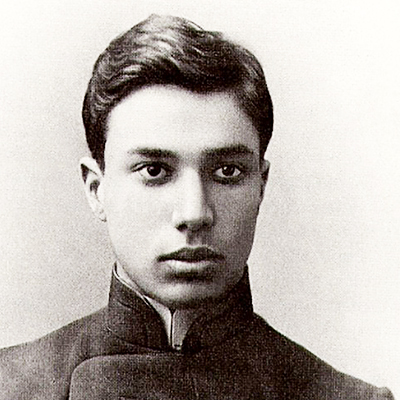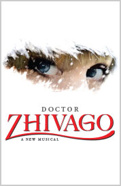Track the Evolution of Epic Love Story Doctor Zhivago, From Banned Book to Broadway Musical
Just when things are finally thawing out in New York City, an icy blast from Russia is blowing onto Broadway courtesy of Doctor Zhivago! Tony winner Des McAnuff directs the world premiere musical, based on the Nobel-winning novel by Boris Pasternak and set in (and after) the twilight of Czarist Russia. Tam Mutu stars as Yuri Zhivago, a doctor, poet and political idealist caught in the storms of history and torn between his devoted wife and his lover Lara Guishar. Read up on this larger-than-life love story before it opens at the Broadway Theatre on April 21, starring Tam Mutu and Kelli Barrett as Yuri and Lara, along with Broadway vets Tom Hewitt, Paul Alexander Nolan and Lora Lee Gayer.

Mother Russia
The early part of the 20th century was an incredibly turbulent time in Russian history, as revolution followed revolution and world war followed civil war. The Revolution of 1905, a wave of worker strikes and military unrest that ended in thousands of deaths across the Russian Empire, laid the groundwork for the country's larger Russian Revolution in 1917. While also embattled in World War I, Russia went through two revolutions in that year, the second of which saw the Bolsheviks overthrow the last Czar of Russia, Nicholas II (father of the famous Anastasia) and replace the country's long-standing autocracy with communist rule—which came with its own iron-fisted problems.

A Born Artist
As this political turmoil was just starting to simmer, Boris Pasternak was born in 1890 into a very artistic Moscow family; his father was a painter and his mother a concert pianist. Big-deal Russian artists like composer Sergei Rachmaninoff and poet Rainer Maria Rilke were visitors to the Pasternak home, and novelist Leo Tolstoy was a close family friend (Pasternak's father illustrated his novel Resurrection, and drew the author on his death bed). He began his artistic career as a composer, but gave it up in his early 20s because he was, by his own admission, not good enough. He then studied philosophy and became a writer and translator of Western works, including many Shakespeare plays, but found his true calling as a poet.

Book It
Pasternak was writing in difficult times, but his esoteric style kept him somewhat safe—after a late-night phone from call from Stalin looking for his opinion on another poet's political opinions, the Russian dictator reportedly wrote, "Don't touch this cloud-dweller" next to Pasternak's name, noted the author's niece Ann Pasternak Slater in The Guardian. But when Doctor Zhivago was finally completed in 1956, Soviet authorities banned the book from being published in Russia and tried to keep it from being published elsewhere. Luckily, Milanese publisher Giangiacomo Feltrinelli had received a copy of the manuscript, and the first copy of Doctor Zhivago was published in Italian in 1957.

Cold War Tactics
The CIA saw publishing the book in America as an opportunity to undermine the Soviets. “This book has great propaganda value,” read a CIA memo to the agency's Soviet Russia Division, as quoted by The Washington Post, “not only for its intrinsic message and thought-provoking nature, but also for the circumstances of its publication: we have the opportunity to make Soviet citizens wonder what is wrong with their government, when a fine literary work by the man acknowledged to be the greatest living Russian writer is not even available in his own country in his own language for his own people to read.” Thanks in part to CIA intervention, Pasternak won the 1958 Nobel Prize for Literature—an incredibly humiliating event for the Soviet Union. He turned down the prize, which would have meant his exile. "Leaving the motherland will equal death for me," he wrote to then-Soviet premiere Nikita Khrushchev. "I am tied to Russia by birth, by life and work." Pasternak died in 1960. Doctor Zhivago wasn't officially published in Russia until 1988; in 1989 Pasternak's son was finally allowed to accept his father's Nobel Prize.

Love on Film
Film director David Lean was no stranger to stories of epic scope: by the time he directed the 1965 film adaptation of Doctor Zhivago, he'd already won two Oscars for The Bridge on the River Kwai and Lawrence of Arabia. Peter O'Toole, Marlon Brando and Paul Newman were all considered for the role of Zhivago, which eventually went to Omar Sharif. He starred opposite Julie Christie as Lara and Geraldine Chaplin (daughter of Charlie) as Zhivago's wife, Tonia. The film had to be shot largely in Spain because the novel was still banned in Russia. Despite a lukewarm critical reception—Bosley Crowther called the film adaptation "closer to Hollywood than to the steppes" in his New York Times review—Zhivago went on to win five Oscars and become the financial saving grace of MGM Studios.

Music For a Revolution
Given the sprawling timeframe and massive political backdrop (not to mention nearly 600 pages) of Doctor Zhivago, adapting it for the stage is incredibly ambitious. A first attempt, simply called Zhivago, premiered at La Jolla Playhouse in 2006; a reworked version met with great success with it debuted in Australia in 2011. The tuner features a book by playwright Michael Weller, music by Lucy Simon (The Secret Garden) and lyrics by Michael Korie (Grey Gardens) and Amy Powers. And yes, they have honored audience requests to include the film's wildly popular "Lara's Theme," which Simon called "as iconic in Zhivago as the snow” in The Observer. An ambitious piece, sure, but worth it. "It's been along time since we're had a really passionate love story with life or death consequences," Weller told Broadway.com. "I find that exciting. And sexy."

Leading Lovers
Leading the Broadway cast of Zhivago is Tam Mutu, the sweet-smelling West End heartthrob/professional stage brooder who is finally making his debut on the Great White Way opposite his Lara, Kelli Barrett. "We had a really great connection and spark in the room," Mutu told Broadway.com, and Barrett agreed. "We don't have to work on it at all," Barrett said of their natural stage chemistry. With a cast and creative team this talented, we're going to have to trust them when they (practically) all pull out the same word to describe their sumptuous show: It's gonna be epic.
Related Shows
Articles Trending Now
- Death Becomes Her, Maybe Happy Ending, Oh, Mary! and More Earn Nominations for the 2025 Broadway.com Audience Choice Awards
- Maybe Happy Ending Will Be Hitting the Road on a National Tour, Launching Fall 2026
- Ali Louis Bourzgui Reflects on Joining Hadestown, His Upcoming Album and Processing the Experience of Tommy
